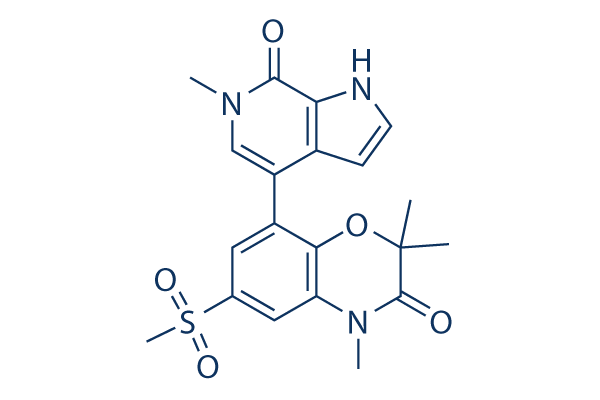research use only
INCB057643 BET inhibitor
Cat.No.S8714

Chemical Structure
Molecular Weight: 415.46
Quality Control
Solubility
|
In vitro |
DMSO
: 83 mg/mL
(199.77 mM)
Water : Insoluble Ethanol : Insoluble |
Molarity Calculator
|
In vivo |
|||||
In vivo Formulation Calculator (Clear solution)
Step 1: Enter information below (Recommended: An additional animal making an allowance for loss during the experiment)
Step 2: Enter the in vivo formulation (This is only the calculator, not formulation. Please contact us first if there is no in vivo formulation at the solubility Section.)
Calculation results:
Working concentration: mg/ml;
Method for preparing DMSO master liquid: mg drug pre-dissolved in μL DMSO ( Master liquid concentration mg/mL, Please contact us first if the concentration exceeds the DMSO solubility of the batch of drug. )
Method for preparing in vivo formulation: Take μL DMSO master liquid, next addμL PEG300, mix and clarify, next addμL Tween 80, mix and clarify, next add μL ddH2O, mix and clarify.
Method for preparing in vivo formulation: Take μL DMSO master liquid, next add μL Corn oil, mix and clarify.
Note: 1. Please make sure the liquid is clear before adding the next solvent.
2. Be sure to add the solvent(s) in order. You must ensure that the solution obtained, in the previous addition, is a clear solution before proceeding to add the next solvent. Physical methods such
as vortex, ultrasound or hot water bath can be used to aid dissolving.
Chemical Information, Storage & Stability
| Molecular Weight | 415.46 | Formula | C20H21N3O5S |
Storage (From the date of receipt) | 3 years -20°C powder |
|---|---|---|---|---|---|
| CAS No. | 1820889-23-3 | -- | Storage of Stock Solutions |
|
|
| Synonyms | N/A | Smiles | CC1(C(=O)N(C2=CC(=CC(=C2O1)C3=CN(C(=O)C4=C3C=CN4)C)S(=O)(=O)C)C)C | ||
Mechanism of Action
| Targets/IC50/Ki |
BET
|
|---|---|
| In vitro |
INCB057643 inhibits binding of BRD2/BRD3/BRD4 to an acetylated histone H4 peptide in the low nM range, and is selective against other bromodomain containing proteins. In vitro analyses show that this compound inhibits proliferation of human AML, DLBCL, and multiple myeloma cell lines, with a corresponding decrease in MYC protein levels. Cell cycle analyses indicate that G1 arrest and a concentration-dependent increase in apoptosis are seen within 48 hours of treatment with this chemical. Production of several cytokines, including IL-6, IL-10 and MIP-1α, was repressed by this compound in human and mouse whole blood stimulated ex vivo with LPS. It inhibits proliferation of prostate cancer cell lines. In short-term cell proliferation assays, this chemical appears more effective against androgen-dependent (VCaP and LNCaP) than androgen-independent (DU145 and PC3) cells. |
| In vivo |
Oral administration of INCB057643 resulted in significant anti-tumor efficacy in xenograft models of AML, myeloma, and DLBCL. Treatment of mice bearing 22Rv1 tumor xenografts with this compound (3 mg/kg) led to significant inhibition of tumor growth (T/C%:45%) and consistent reduction of tumor weight relative to vehicle-treated mice. |
References |
|
Tech Support
Tel: +1-832-582-8158 Ext:3
If you have any other enquiries, please leave a message.






































